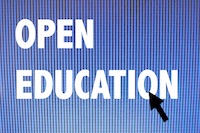Approaches to Open Education and Social Justice Research
 Why a Special Collection on Open Education and Social Justice? Isn’t open education intrinsically a social justice matter? And why a focus on theorising open education and social justice? There has been long standing but separate practice and scholarship in both open education and social justice but the relationship has only become the focus of attention quite recently. As is so often the case, this started in more informal social media and blogging spaces (Lambert 2018b; Saheli Singh 2015; Watters 2014) and then was developed through educational technology conferences with an emphasis on critical inquiry (Bowles 2019; Cronin 2016; de los Arcos & Pete 2019; Khoo 2019) before shifting to formal outputs (Hodgkinson-Williams & Trotter 2018; Lambert 2018a; Lambert 2020a).
Why a Special Collection on Open Education and Social Justice? Isn’t open education intrinsically a social justice matter? And why a focus on theorising open education and social justice? There has been long standing but separate practice and scholarship in both open education and social justice but the relationship has only become the focus of attention quite recently. As is so often the case, this started in more informal social media and blogging spaces (Lambert 2018b; Saheli Singh 2015; Watters 2014) and then was developed through educational technology conferences with an emphasis on critical inquiry (Bowles 2019; Cronin 2016; de los Arcos & Pete 2019; Khoo 2019) before shifting to formal outputs (Hodgkinson-Williams & Trotter 2018; Lambert 2018a; Lambert 2020a).
One of the reasons that this relationship has needed to be asserted has been because open education itself has been going through a period of change; it has become more mainstream (Weller 2014), it has formed arteries and subfields (Jhangiani 2017), and it has also been subjected to “openwashing” by market forces (Allen 2019; Lamb 2013). Therefore, the cluster of practitioners and scholars for whom open education is a strategy of better education for a fairer and more just world have been turning their attention to understanding what exactly this means, what form the relationship takes and how it can be best understood and supported. It is a timely reflection, looking back on a decade or more of investments in re-usable openly licenced OERs and then widely accessible MOOCs – neither of which did as much as hoped to democratise knowledge or change educational access patterns.
Within the current “critical turn” or critical appraisal of open education (Lambert 2020b), this Special Collection provides evidence of social-justice based open education initiatives which improve the experience and outcomes for different global under-represented learners in particular and specific ways. It aims to present a more nuanced conversation about progress towards social justice, and advance understanding of the many diverse ways that open education can act as, or be aligned with, social justice in different contexts.







